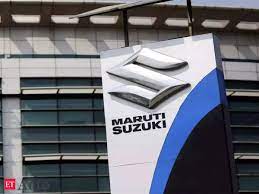NEW DELHI, Aug 21: The hike in interest rates has not yet impacted demand for vehicles but the real picture will emerge once the semiconductor shortage issue is addressed and production gets normalised, according to a senior official of Maruti Suzuki India.
With the launch of new products such as Grand Vitara and Brezza adding more to bookings, the company’s pending orders have gone up to 3.87 lakh units, from around 2.8 lakh in the last quarter, Maruti Suzuki India Ltd (MSIL) Senior Executive Officer (Marketing & Sales) Shashank Srivastava said.
“Theoretically speaking, it should have a negative impact because interest rates going up (have an impact on) discretionary spending, which also includes spending on cars…But at the moment that we are not feeling that,” he said in an interaction.
He was responding to a query on whether the interest rate hike has impacted demand for cars.
Earlier this month, the Reserve Bank of India (RBI) had raised the key interest rate by 50 basis points. This was the third consecutive increase since May, bringing interest rate to the pre-pandemic level.
Srivastava said the reason for the interest rate hike not impacting demand was that due to the supply chain disruption during the pandemic and semiconductor shortage issues, production was impacted and the pent up demand could not be met.
“…Once you have a large production, then you will get to know the actual demand pattern…We have not been able to produce as per the underlying demand pattern,” he added.
As far as the semiconductor supply issue is concerned, he said it has improved a lot but still there are constraints that have prevented the company from running its production capacity at 100 per cent and it is difficult to give a timeline when it will be fully normalised.
“We do not have a visibility going forward of the exact availability of chips,” Srivastava said.
In the May-July period this year, the company produced 95 per cent of its overall capacity, up from the lowest of 40 per cent in September last year, he said.
“When it will become 100 per cent, we don’t know. The visibility for future availability of semiconductors is actually limited. We keep getting updates every week and we keep modifying our estimate but one thing I can tell you is that in this quarter we will not see 100 per cent normalisation,” Srvastava said.
MSIL’s production capacity at Gurgaon and Manesar plants in Haryana is around 15 lakh units per annum. Suzuki Motor Gujarat, which supplies vehicles exclusively to MSIL, has an additional installed production capacity of 7.5 lakh units per annum.
Srivastava said the company’s new SUV Grand Vitara has so far received 40,000 orders and supplies will start in September.
Besides, he said the new Brezza has received around 90,000 orders out of which around 70,000 are pending. Maruti Suzuki is trying to increase production of the model to over 10,000 units per month which it did last year.
“There is also a waiting period for the new Ertiga, XL6 and Baleno,” he said, adding for Baleno the pending order is around 38,000 units.
On the overall industry growth, Srivastava said the auto sector is looking at record sales this fiscal.
“The projection in the industry was about 3.46 million to 3.52 million units at the beginning of the year. There seems to be consensus in the industry of it being revised to 3.6 million to 3.7 million units, which will be the highest ever. The last highest was 3.37 million units in 2018-19,” he said. (PTI)
Trending Now
E-Paper


